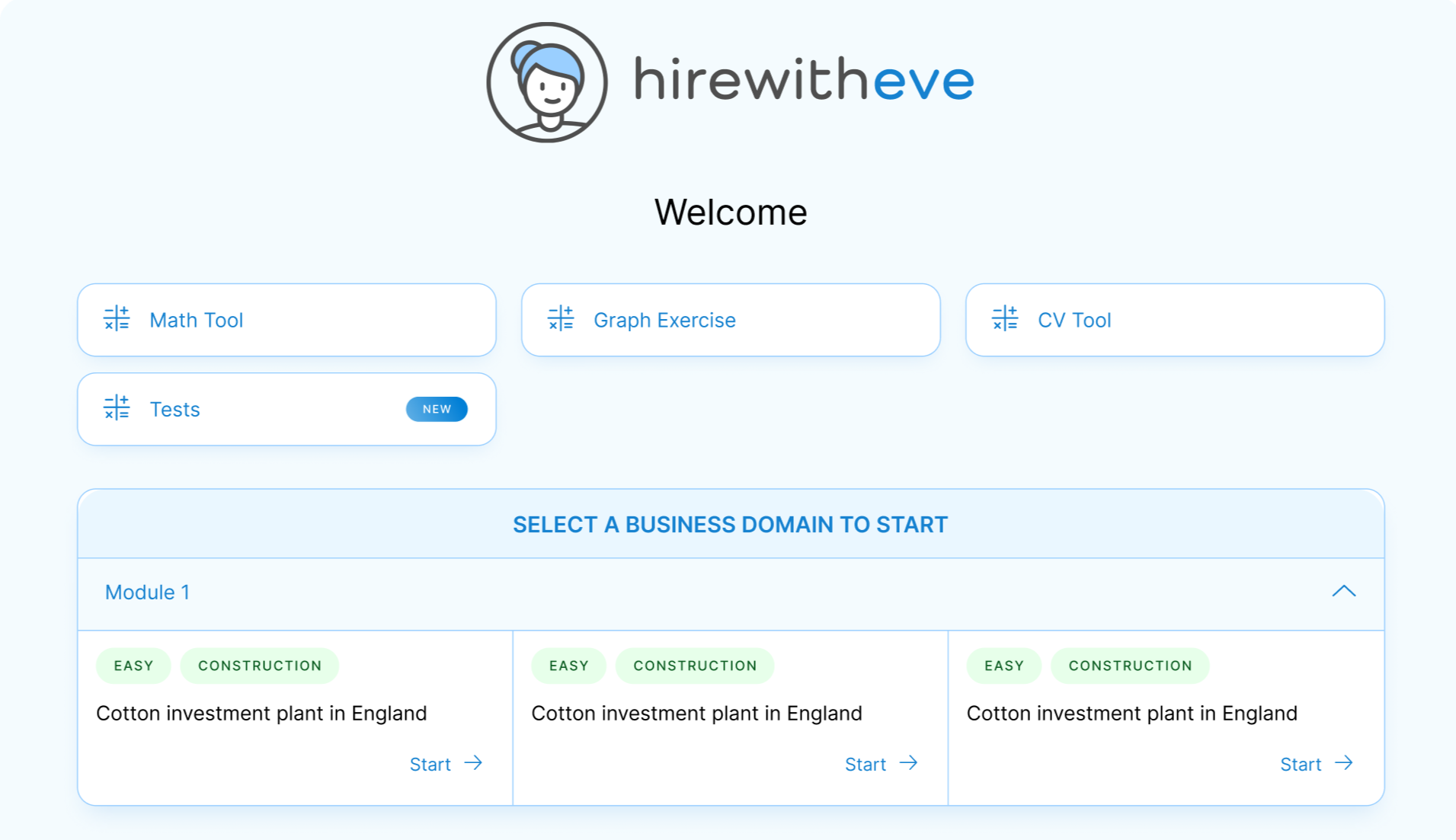Optimizing Employee Retention with Skills-Based Hiring

Losing talent can seriously disrupt growth and put your business on the back foot. If that’s not scary enough, replacing employees in today’s tight labor markets is tough. It's no surprise that retention is top of mind for most employers. Despite this, the last few years have seen some of the worst turnover rates in decades, leaving employers confused and frustrated.
So, what’s going wrong? Maybe you’re hiring people who were a flight risk to begin with. Perhaps you’re trying to fix problems when it’s already too late. Or maybe you’re using outdated retention strategies that no longer work. Whatever the reason, we can help. This guide will show you how HirewithEve's skills-based hiring is the ultimate way to find – and keep – the best talent.
Table of contents
The Costs of Losing Talent Today
The Real Reasons for Employee Departures
How Traditional Recruiting Methods Undermine Retention
Why Skills-Based Hiring is the Solution
Benefits of Skills-Based Hiring
Implementing Skills-Based Hiring with HirewithEve
Conclusion
The Costs of Losing Talent Today
Here’s why you simply can’t afford to lose talent in today’s landscape.
Stalls Progress
HR expert Yashna Wahal shared insights about why turnover damages businesses more now than before:
“Gone are the days when four employees were hired to do the same job. Today, we run lean teams where each employee has a specific and unique contribution toward team goals. While this is excellent for efficiency, it puts you at risk of total disruption when someone leaves. When you lose experienced team members, there’s usually a gap before you find a replacement and get them up to speed. This gap can slow operations, affect service quality, and delay project deadlines. This is bad for business – and gives competitors the perfect opportunity to swoop in and capture your market share.”
Makes You Vulnerable
Post-pandemic, the labor market was tight, with more jobs than skilled workers to fill them. While the number of open jobs is falling and labor market conditions are easing, the Federal Reserve noted that “difficulties persist in attracting workers for highly skilled positions.” With labor markets in constant limbo, losing talent reduces workforce stability and makes you more vulnerable to market moods.
Significantly Increases Expenses
Losing valuable employees can set you back financially. The Society for Human Resource Management (SHRM) found that companies pay $4,700 on average to hire a new employee, with costs rising to three to four times the position’s salary. When replacing an employee, you’ll likely pay 18-20% more in salary to hire externally. Plus, there are additional expenses like recruiting agency fees, candidate travel expenses, and costs associated with leaders’ time spent in the hiring process.
Destroys Your Employer's Brand
Companies with high turnover rates raise questions in the job market, like “Why are so many people leaving?” These companies earn labels as bad employers on websites like Glassdoor, where today’s tech-savvy workers openly share their views and feedback. A bad reputation leads to more departures since employees might consider moving to better firms, creating a vicious cycle.
Creates a Negative Work Environment
When an employee leaves, existing team members often pick up the slack and take on additional tasks until a replacement is found. This can lead to frustration, resentment, and burnout, creating a toxic atmosphere and pushing more team members out the door.
The Real Reasons for Employee Departures
Studies from Pew and Forbes looked into why employees quit their jobs. Reasons include lack of flexibility, problems with colleagues or customers, high workload, and more. While the usual narrative blames employers for not providing what employees need, it's not always the case.
Our view? The real problem is that employers are mis-hiring employees without properly checking if they align with the role, team, or company.
For example, not all employers are expected to provide flexibility. But if they hire someone looking for flexible hours, the employee is likely to be disappointed and jump ship.
How Traditional Recruiting Methods Undermine Retention
Degree-Based Selection
A Harvard Business Review article showed a weak correlation between college degrees and job performance. Despite this, employers hire people with fancy degrees or from top-notch colleges, assuming these candidates are more likely to succeed. Without assessing candidates’ real-world skills, you’re likely to hire someone who can’t perform, dislikes their job, and eventually leaves – assuming you don’t let them go first.
Resume Screening
In a survey of 1,500 employers, 87% said they experienced problems with resumes. Fifty-one percent weren’t sure about resume accuracy, and 43% found it difficult to determine candidates’ skills from their resumes. Relying on resumes can lead to progressing candidates who look good on paper but struggle with the job.
Additionally, resumes tell you nothing about candidates’ personalities, attitudes, and motivations.
Unstructured Interviews
Did you know that 92% of employers use unstructured interviews in their selection process? In these interviews, interviewers make up questions as they go rather than using a fixed set of questions for every candidate. The downside is that it’s easy to go off on a tangent, skipping crucial questions about skills, knowledge, and decision-making. This can lead to hiring based on gut feeling rather than reliable data, increasing the likelihood of hiring a candidate who won’t stay long.
One-Way Evaluations
Traditional recruiting is often a one-sided process where companies evaluate candidates. Applicants who don’t have opportunities to learn more about a job or the company’s culture might feel misled or dissatisfied when they start work. One survey found that a third of new employees quit their jobs within the first six months, with 43% quitting because their new job didn’t meet their expectations.
Why Skills-Based Hiring is the Solution
Properly assessing job fit at the time of hiring could have prevented the problems discussed above. The best way to do this is through skills-based hiring. Skills-based hiring focuses on candidates’ skills and abilities for a job rather than relying on their educational qualifications, previous job titles, or companies they’ve worked for. Companies using a skills-based approach use online tests, technical and behavioral interviews, case studies, simulations, and other practical tools to make screening and offer decisions.
Benefits of Skills-Based Hiring
Prevents Mis-Hiring
When employees are selected based on the skills needed for a job, there’s a good chance they’ll perform well in their role. This sense of competence and fulfillment can increase job satisfaction, closely linked to employee retention. Beyond technical expertise, skills-based hiring also lets you measure the personality traits associated with success in a specific role or work environment.
Enables Two-Way Evaluations and Candidate Self-Selection
Skills-based hiring gives applicants a glimpse of what’s expected of them in a new role, so there aren’t surprises when they join. For instance, putting candidates through tests, case studies, or simulations helps them learn more about the skills they need for the job. Candidates who don’t find the work enjoyable or stimulating can choose to opt out of the process at this stage rather than once they’ve joined the company.
Promotes Career Development and Internal Mobility
Research by SHRM showed that 68% of workers would stay with their employer throughout their careers if the company helped them upskill. Similarly, 65% would stay loyal if their employer helped them re-skill. Modern employees want opportunities to switch careers and expand their horizons, and this is where skills-based methods come in.
Assessing employees’ skills and abilities can give you a better sense of which other roles they’re skilled for or have the aptitude to learn effectively. This allows you to provide internal growth and mobility opportunities so employees don’t need to go elsewhere for a fulfilling career.
Boosts Employee Confidence and Motivation
Whether hiring someone new or moving an existing worker to another role, putting employees in jobs they’re truly skilled for will likely increase their confidence, satisfaction, and retention levels. Our research found that employee happiness levels were 10% higher for skills-based hires compared to experience-based hires.
Fosters a Diverse and Inclusive Environment
A recent piece in People Management reveals that attractive wages and benefits are no longer guarantees of securing and retaining talent. For today’s employees, especially the new generation of workers, a diverse workplace significantly improves staff retention. Harvard Business Review highlights the importance of inclusion, noting that no amount of free coffee, generous bonuses, or recognition programs will work if employees aren’t comfortable being themselves at work.
Skills-based hiring removes unconscious biases through objective, data-driven decisions. Ignoring credentials, backgrounds, or demographic factors unrelated to performance makes hiring fair and inclusive. You’re more likely to build a diverse workforce and merit-based company that employees are proud to work for.
In our study, 84% of employers found that skills-based hiring improved diversity. Deloitte showed that skills-based organizations were 47% more likely to provide an inclusive environment.
Implementing Skills-Based Hiring with HirewithEve
Here’s how you can adopt skills-based hiring to improve employee retention in your company using HirewithEve.
Widen Your Candidate Pool
Skills-based hiring means giving everyone a fair chance to demonstrate their capabilities for a role. Source candidates from beyond traditional channels like campus hiring. For instance, join networking events or host hackathons to meet and connect with candidates from all walks of life. Additionally, write skills-based job descriptions focusing on the knowledge and skills needed for the specific role rather than asking for degrees or certain experience. This way, you’ll tap into a wider talent pool, make stronger hiring decisions, and recruit candidates who might be better long-term fits.
Swap Resumes and Profiles for Multi-Measure Talent Assessments
Viewing candidates’ resumes and LinkedIn profiles leads to biases that weaken hiring decisions. For an authentic skills-based approach, ditch these inaccurate tools and opt for talent assessments instead. Talent assessments are online tests measuring candidates’ job-specific skills, aptitudes, personality traits, and more. They’re fair, objective, and incredibly easy to roll out with HirewithEve.
HirewithEve offers hundreds of tests to choose from. You can combine up to five tests in a single multi-measure assessment and even add custom questions for deeper insights. Evaluate internal and external candidates on hard skills, cognitive abilities, soft skills, and situational judgment for a holistic view of their suitability for a role. Don’t forget to put candidates through personality assessments, which are critical to better retention.
At HirewithEve, we believe a candidate’s ability to fit in with and enhance your company culture determines whether you retain them. Put candidates through our culture and add an assessment to learn about their beliefs, values, and expectations – so you don’t end up with someone who may be technically sound but doesn’t vibe with the team or company.
Use Structured Interviews
Structured interviews, which include a fixed set of carefully crafted, competency-focused questions, offer good insights into candidates’ skills and readiness for a job. Every candidate gets the same questions, making the process fair and less prone to bias. Compared to unstructured formats, structured interviews are better at predicting long-term job success, making it more likely that you’ll hire someone who’ll work out in the long run.
Structured interviews also provide a great opportunity for candidates to evaluate your company. Describe your company’s culture and ask candidates questions about their ideal workplace and culture to see if there’s a match.
Conclusion
Retaining employees is the best way to stay competitive and avoid getting caught in today’s war for talent. Despite following various retention trends, employers are losing workers at lightning speed. This boils down to bad hiring. When you base hiring decisions solely on credentials or resumes, you’re more likely to hire employees who are unfit for the job, dislike your culture, or can’t gel with your team – all solid signs of future attrition.
On the other hand, a skills-based hiring approach is the ultimate way to retain talent. With HirewithEve’s skills and personality assessments, you can hire employees who’ll succeed in their jobs, vibe with your team, and stay for the marathon – not just the sprint.
Target Your Talent
Unlock tailored solutions for your recruitment and hiring needs with Eve Platform's extensive case study library.
Subscribe now to enhance your HR expertise and excel in your role.
Free Resources

Transforming Hiring: 7 Key Recruiting Metrics
Enhancing recruitment processes with data-driven insights for better hiring outcomes.

Reducing Hiring Bias with Hirewitheve.
Utilizing Hirewitheve to combat bias and streamline recruitment processes effectively.

Hiring Detail-Oriented Candidates
HirewithEve enhances hiring by accurately assessing candidate's attention to detail-oriented.








